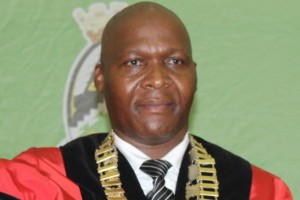Category Archives: Latest News
Cooperatives undergo international training
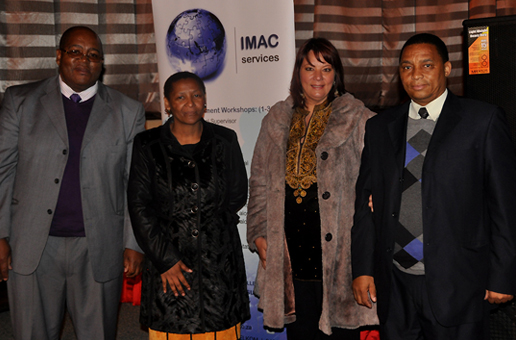

The International Labour Organisation (ILO) hosted its first My.Co-op training in Virginia last week. This was the first training to ever be hosted in South Africa and 85 cooperative members from the Matjhabeng Local Municipality underwent training in co-operative management.
This came after a Welkom businesswoman, Mirna de Hart, visited the ILO international training centre in Turin in 2012.
“After returning from the ILO international training centre in Turin in 2012, I started the ground work in the Matjhabeng Local Municipality to bring the ILO training programme for cooperatives to our district.
“Through the support of the Welkom SEDA office; the ILO Free State Initiative and on request of the MEC for agriculture, Mamiki Qabathe; my company, IMAC Services, was able to train 85 cooperative members on this programme during May and June this year,” said De Hart.
She added that the initiative was supported fully by the Matjhabeng Local Municipality; especially the department of local economic development (LED). The premier’s office also attended the ceremony which was held in Virginia.
“This was the first ILO My.Co-op training that took place in South Africa and a milestone for cooperative development in our province,” said De Hart.
The objective of the training is to enable existing and potential managers of agricultural cooperatives to identify and address major challenges that are specific to cooperatives in market orientated agricultural development.
The morning started with a short two-hour workshop that was presented by De Hart, to the cooperative members on the importance of having meetings and on how to write the minutes of those meetings.
Qabathe said the department is very happy to be associated with the initiative.
“This is a great initiative to boost the economy of the province and especially areas like Matjhabeng where alternative sources of income have to be developed. We believe that agriculture and tourism can make an enormous difference and we want to congratulate these 85 members on their achievement.”
The newly graduated members were excited about the benefits of the training.
“There is always room for improvement and one can never know enough especially when you want to make your dream a success. Throughout our training, we received the necessary skills and we will keep on attending the brief workshops to enhance the skills that we are lacking,” said Josephine Sekgala, of the Sew Together Cooperative.
De Hart was also selected as one of three candidates from South Africa to participate in this year’s study tour of the Japanese cooperative movement.
“Considering my involvement in the South African cooperative movement, I believe that my participation will have a considerable multiplying effect in our community.”
The tour is organised by the Japanese Consumer Cooperative Union (JCCU) and the ILO and will take place from September 2 to 11.
Mayor revamps delapidated infrastructure
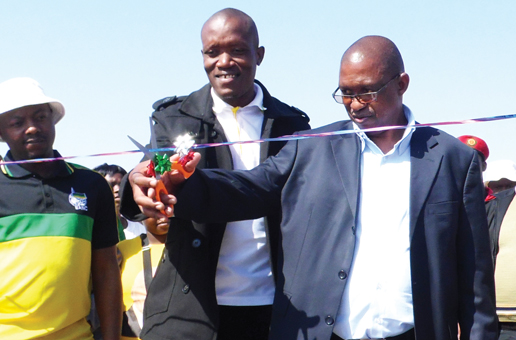
The executive mayor of Matjhabeng Local Municipality, Sebenzile Ngangelizwe, and municipal officials embarked on a two-day road show last week to launch and hand over various service delivery projects in different wards of the municipality.
“Some of these service delivery projects are being completed and others are being launched in the different wards. We want the community to be aware of what is taking place in their area. This operation also gives the municipality an opportunity to interact with the community.”
The mayor’s entourage visited wards in Thabong and Bronville. Other townships expected to follow include Kutlwanong, Meloding and Mmamahabane.
Ngangelizwe also conducted a door to door walkabout in various wards where he listened to resident’s service delivery concerns.
“What we have come to realise with the door to door walkabout is that even though there is still a lot of work that needs to be done within townships, people are grateful for the projects that are being implemented in their areas. Projects that are being handed over include completed paved roads; graveyard fencing that is still in progress, completed sewage pipelines and pump stations.”
Local resident, James Rooisten, said the mayor’s road show will go a long way in improving service delivery in the municipality.
“We used to only see people coming into our neighbourhood and big machines digging without knowing or being informed about what is happening. We are grateful that the executive mayor has come to us to explain various projects in our ward.
“We also understand that we need to be patient while the municipality implements some of the projects which require a lot of money. There are six other towns that also need the help of the municipality, but when it is our turn we are very happy,” said Rooisten.
A road of approximately 105 metre’s to the value of R1.4-million was completed in front of Rooisten’s home in Oppenheimer Park, Thabong.
According to Rooisten, the homes along the previous gravel road used to be dusty and difficult to keep clean before it was tarred.
“On windy days, all the dust would blow into our homes from the road. When it rained, we could not really go anywhere because of the mud. Cars would even get stuck in the mud. Therefore, we are grateful that this road has been tarred and is now completed.”
The operation started at a school in Thabong, where the community was entertained by Sechaba Pali and other local artists.
Police business fight against crime


Thabong business people met with the South African Police Service (SAPS) management last week to demand tough police action against rampant crime in the township.
One of the organisers of the meeting and owner of Mthimkhulu Bottle Store and Radebe Transport, Steve Radebe, said business people in the area had convened the meeting because they were concerned with the spate of violent crime and robberies that are affecting a majority of businesses in the Welkom township.
“We are business people trying to make a living and to contribute to the growth of the economy of the country, but criminals are targeting us. Two weeks ago five criminals walked into our house and hit my mother with a firearm on the head and robbed us of cash amounting to R75 000.”
Radebe said the robbery has had an adverse effect on his business. He is now struggling to pay some of his suppliers and insurance companies have decided to classify him as a high risk client subsequently increasing his monthly premiums.
“I am a victim just like many other local business people who find themselves in my situation. Unless we stand together to fight the scourge of crime in our community, our businesses are in great danger of collapsing. We must come together to help each other to fight crime.”
Police has pledged to work with business owners to fight robberies and break-ins that have affected them.
“Our aim as the SAPS is to be trusted by the business people of Thabong; we are willing to work together with the community towards the common goal of decreasing robberies and burglaries of businesses,” said Captain Riaan Fouche, of the Thabong SAPS.
He called on business people to report crime promptly to the police to ensure speedy resolution of cases.
“I admit as a police officer that there is corruption among some of my colleagues who collude with criminals. But that must not stop you from reporting your cases because justice needs to be done in our country. Not all of us police officers are corrupt; all we need is the community’s cooperation in order to investigate and gather information we need to facilitate successful prosecution of criminals.
“We must take the responsibility of reducing crime by coming up with solutions to defeat it. We do understand the terrible emotions victims are going through, especially when you are trying to stand up and fight unemployment by becoming your own boss,” added Fouche.
Fouche said crime statistics in the area showed a drastic increase in 2013 compared to the previous years. He said criminals targets mostly foreign owned businesses. He said police are deploying more physical and human resources to clamp down on businesses robberies and burglaries in the area. According to Fouche, Thabong police officers are meeting the community tomorrow in Putswastene to discuss the crime situation in the township.
Operation Patala commences in Matjhabeng
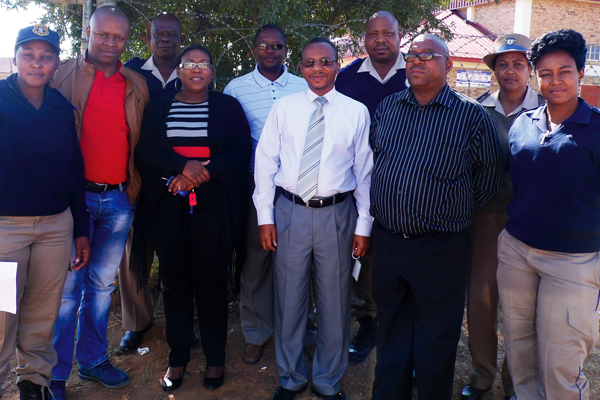

A total of seven schools in Odendaalsrus and Kutlwanong that still owe the Matjhabeng Local Municipality thousands of rands in basic services bills, were cut off on Monday as municipal officials demonstrated the urgency of Operation Patala.
Operation Patala was launched by the Matjhabeng Local Municipality last year October to recoup a combined debt of R 1.5 -billion owed by consumers and taxpayers.
Last year municipal manager, German Ramathabane said only 48 percent of residents in the municipality were paying their rates and taxes. Residents, businesses, government agencies and schools were warned several times to settle their current accounts and make arrangements for settlement of arrears or otherwise their services would be terminated.
According to Bongani Mbongo, coordinator of the operation, since Operation Patala was launched there has been a lot of improvement in the payment rate. The initial amount of debt to be collected was R8. 8-million and it has now reduced to R6.7-million. The total collected amount of money collected to date is more than R2-million.
He said the Matjhabeng Local Municipality had set up a Batho Pele Service Centre in the old finance section of the main municipal building in Stateway, Welkom, as well as various Matjhabeng units where residents with outstanding bills are processed.
More municipal officials have also been deployed to assist residents with disconnection and related billing queries.
“The municipality has tried its best to make this a smooth operation, yet we discovered almost 30 water by-passes in Welkom. This is why we as officials came out today to ensure that Operation Patala is handled according to the books so that it can be a success,” said Mbongo.
The manager of the credit control department, acting manager of water demand department and the head of department for public safety and transport joined in the operational visits that were scheduled to continue in Odendaalsrus this week and continue to the other towns in the municipality.
About 200 water meters will be installed where there were none before and where there have been disconnections following the removal of by-passes.
The council envisages installing a new system of water meters throughout the Matjhabeng Local Municipality. It is also addressing the matter of water leakages with the assistance of the department of forestry and water affairs.
An inter-governmental task team will monitor the water lines in Matjhabeng to establish where intervention is critical.
“Residents must remember that, to provide quality services, the municipality needs income generated from, among other, electricity and water. Payment defaulters have put an enormous burden on the municipality’s ability to deliver services such as fixing of roads, streetlights and high mast lights amongst other.
“We have gone out of our way to plead with citizens to play their part but to no avail. We have also implemented our credit control policy which includes letters of demand and other measures to retrieve the payments in arrears. With no desirable outcomes forthcoming, we are switching off,” added Mbongo.
The municipality is also appealing to citizens who qualify for free basic services to register for the indigent registry with their ward councillors. The Indigent registry is a government assistance programme for all South Africans. It comprises 6 kl free water and 50kw free electricity per month.
Ramathebane said they are also investigating the use of water by informal car washes. Car washes that do not have water meters are requested to visit the Matjhabeng finance department.
Completing RDP houses in Welkom
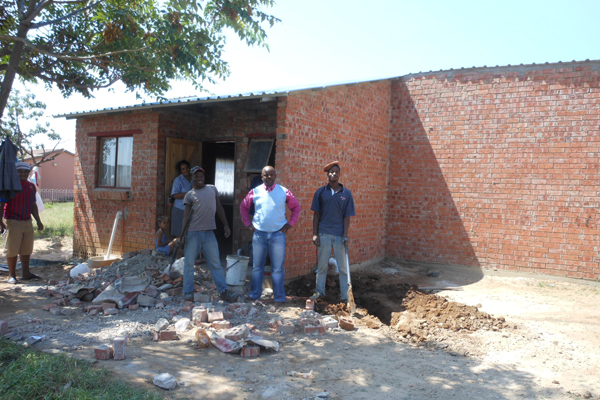
 Residents of Bronville and Hani Park in Welkom, who have not received RDP houses and those whose houses are incomplete, will finally have their wishes granted, the executive mayor of the Matjhabeng Local Municipality, Sebenzile Ngangeliswe promised during his budget speech.
Residents of Bronville and Hani Park in Welkom, who have not received RDP houses and those whose houses are incomplete, will finally have their wishes granted, the executive mayor of the Matjhabeng Local Municipality, Sebenzile Ngangeliswe promised during his budget speech.
“There are several problems that we as a government have been facing with contractors and tenders. Therefore this term our goal is not to seek service providers who when a tender is awarded, the first thing they think of is to buy a luxury car and forget about the project. We need people who are serious about service,” said Ngangelizwe.
Jannie Oosthuizen, managing director of Quick Leap Investments and main contractor of the R130-million project to build 6 000 houses in Hani Park and Bronville, promised that the unfinished houses will eventually be finished now.
“The Hani Park and Bronville project is my passion because it is the first of its kind in South Africa. We would like to assure both the provincial and local governments that we are fully on board with the project, and we want to produce a good product at the end of the day.
“We have applied for this project, so if my company does not complete all these houses, it would be a loss for us,” said Oosthuizen.
He attributed the sluggish pace of the project to delays by manufacturers to deliver supplies.
“Everything we order today is only delivered to us after six months. For example, we have had to stop our work because we are still waiting for the roofing material that we recently ordered.
“As you can see, these are not ordinary RDP houses; they have solar water heaters and a plaster ceiling that keeps the house cool so the occupants do not have to pay to have their lights on,” explained Oosthuizen.
Carrie Jansen of Bronville is part of those whose homes will be completed. She said so far things that need to be completed in her house are the roof, windows and door.
“We moved into the house officially and made temporary provision for a roof and windows and hung curtains for doors. We know it will take a long time, but my family and I are willing to wait to have a complete home,” said Jansen.
Mayor prioritise sewage pipeline in Mandela Park

The executive mayor of the Matjhabeng Local Municipality, Sebenzile Ngangelizwe, says his first priority for this term is to ensure that every household in the municipality has a decent toilet.
The executive mayor said he was determined to eradicate bucket toilets in the municipality.
Residents of Mandela Park in Bronville that have been living without a sewer pipeline for more than 20 years will finally be getting proper sanitation and water supply.
“One of the most degrading systems of the apartheid era that is still playing a major role in South Africa today is the bucket toilet system. Despite efforts by the government to bring clean water and sanitation to communities, it remains a challenge,” said Ngangelizwe.
He said areas that are still using the bucket toilet system are parts of Nyakallong, Meloding, Mmamahabane, Kutlwanong and Bronville.
The local community is appreciative of the municipality’s efforts to improve the quality of their lives.
“We are very grateful that our complaints did not fall on deaf ears and that the municipality has made the eradication of the system a priority. The bucket toilet system is a disgrace, and also a major health risk,” said Mandela Park resident, Rosie Kommer.
Kommer said residents had to become used to carrying a bucket full of water whenever they needed to go to the toilet.
“You should definitely be strong to carry a bucket of water to the toilet. Imagine how our elderly were coping with all this, “she said.
Matjhabeng enrols 100 youth for learnership
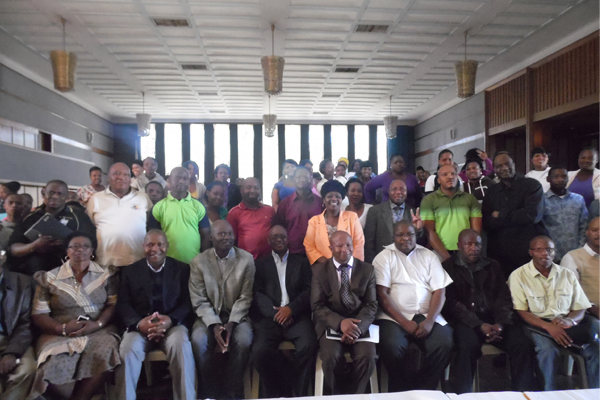
Approximately 100 unemployed young people in the Matjhabeng Local Municipality were employed as part of the Sanitation Learnership programme that was launched on Tuesday by the municipality.
Each one of the councillors of the 39 wards in the municipality was tasked with providing the department of water and energy with CVs of 10 young people that qualified for the learnership. The selected candidates received letters of acceptance to the programme.
“Too many people lack access to sanitation and live without access to clean water in the municipality. The Sanitation Learnership programme will not only benefit the Matjhabeng Local Municipality at large but will also enrich the lives of the people who participate in it, individually,” said the executive mayor of the Matjhabeng Local Municipality, Sebenzile Ngangelizwe.
He said the programme will run for 12 months and will be divided into theory and practical components, which will run for six months each.
Sanitation is the hygienic means of promoting health through prevention of human contact with the hazards of wastes as well as the treatment and proper disposal of sewage wastewater. Hazards can be physical, microbiological, biological or chemical agents of disease.
Wastes that can cause health problems include human and animal faeces, solid wastes, domestic wastewater (sewage, sullage, and grey water), industrial wastes and agricultural wastes. Hygienic means of prevention can be by using engineering solutions for example sewerage and wastewater treatment, simple technologies like latrines, septic tanks, or even by personal hygiene practices like simply washing hands with soap.
The learners will receive an in-depth introduction to water, sanitation and hygiene. They will also be introduced to how a laboratory works, and the various ways to manage waste.
When they have completed the learnership programme, these 100 learners will be qualified enough to either start their own practices or join the municipalities water departments.
“I feel very privileged to have been admitted to this programme. It is very difficult nowadays to find employment, especially without qualifications or experience. This learnership will put a lot of homes in a better position than they previously were,” said Mojabeng Lisele (26) from Odendaalsrus, Ward 19.
Most of the candidates that were chosen for the learnership are between the age group of 18 to 30. They will be attending classes three times a week and must have a 100% attendance register to contribute to their pass rate.
“Unemployment among the Matjhabeng youth has decreased from 60.3 percent in 2001 to 49.7 percent, and this figure remains unacceptably high. Initiatives like this programme will ensure that we can decrease it even more by 2014,” said Ngangelizwe.

